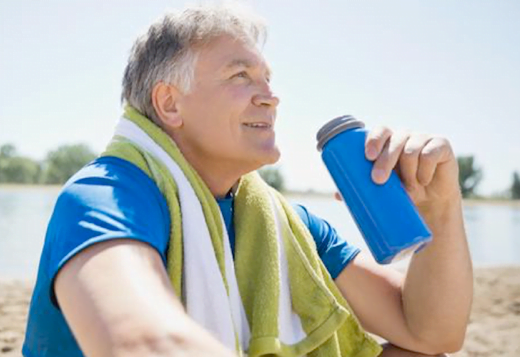Your heart needs exercise — and what you eat before, during and after physical activity can affect your performance and how you feel, says Johns Hopkins registered dietitian Kathleen Johnson, M.A., R.D., L.D.N.
To personalize what you eat around exercise, dietitians consider two main things, she says:
How much exercise.
Someone doing high-intensity interval training or weight training needs to eat more than, say, a beginning walker.

Your fitness goals.
Someone who wants to lose weight has to be careful not to take in more calories than he or she is burning. “A 500-calorie smoothie after an hour of weight training is fine if you’re trying to build muscle, but not if you’re trying to lose weight,” Johnson says.
Working with a dietitian can help you customize your eating based on these factors. But some general guidance is smart for anyone who counts exercise as part of a heart-smart plan.
What to Eat Before Exercise
“Hydration is really important,” Johnson says. She prefers coconut water or plain water to sports drinks, which contain more calories and sugar.
Eat only foods that are familiar to you. “Before a workout isn’t a great time to experiment with a new super smoothie, especially if you’re prone to gas and bloating,” she says.
Ideally, you want to plan your meals so they are no more than an hour and a half to two hours before your workouts. However, if you need to eat closer to exercise than that, grab a small snack focusing on a complex carbohydrate and protein. Think peanut butter and banana, or yogurt with granola.
“If you work full-time and exercise in the evening, think about lunchtime-onward as your pre-workout eating time,” Johnson suggests. That will help you think through nutritious choices, rather than grabbing a quick bite of whatever’s handy.
What to Eat During Exercise
Most people don’t need to eat anything while exercising, Johnson says, “unless you’re an endurance athlete doing a multihour workout.” If you have poor blood sugar control, sipping coconut water can be useful — you’ll get a little sugar along with hydration and balanced electrolytes (necessary substances in your blood and body fluids that you lose through sweat).
What to Eat After Exercise
After exercising, aim for balance. “Don’t overemphasize protein, fat or carbohydrates while neglecting the others,” Johnson says. Protein is especially important, but she advises eating whole foods (lentils, quinoa, fish, beans) over protein powder. Carbs are key too. They don’t have to be grains — fruits and vegetables are mostly carbohydrates. Healthy sources of fat include avocado, fish and olive oil.
Examples of well-balanced post-workout choices include olive oil (a healthy fat) drizzled over quinoa (protein) or trail mix containing nuts like almonds and walnuts, seeds such as pumpkin seeds, coconut flakes, and berries.
Source: Johns Hopkins

